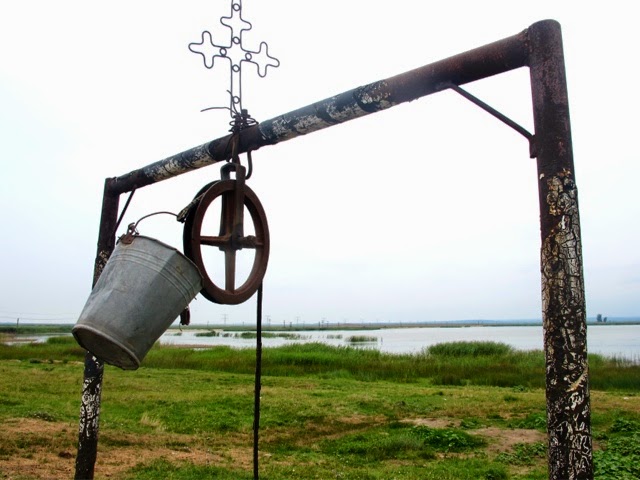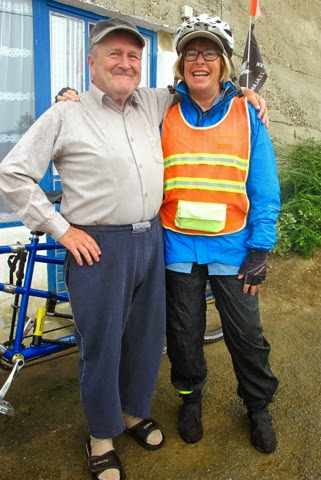Take the latter first. As we rode through southern Romania today we passed two handcarts laden with odds and sods. One was being pushed by an elderly woman. She had manoeuvred the cart so that the right hand wheel had become bogged down in the mud on the side of the road.
I wanted to get off the bike and help her, but no sooner had the thought come to mind than she heaved the cart in the opposite direction and freed it.
We swept by feeling guilty. What on earth was a woman of her age doing pushing a cart like that on her own? What kind of world lets this happen?
And isn't membership of the EU meant to bring benefits to the citizens of the member nations?
A shepherd looks after his goats. It's a simple life and may seem idyllic. But EU membership has made it easier for outsiders to buy up farmland and prices have skyrocketed.
Then there are the toilets, which we rate as worse than the worst we encountered in rural SE Asia. Judy encountered one today that was so bad she wouldn't use it and ducked outside. As she was braving the loo, I was drinking coffee and deciphering a Romanian newspaper which carried a story about the country's high rates of hepatitis - caused by unsanitary conditions. Judy returned to the table grim faced - "no running water", she announced and went off to the bike to get our water to wash her hands.
A woman draws water from a well in a region where the water table is known to be contaminated. Efforts are said to be underway to try to improve living conditions, but the results are not obvious.
This evening she's been hunting around on the internet and has discovered that the area we have been riding through has some of the highest hep rates in the country. Part of the reason is that many toilets are simply a shallow hole in the ground and the water table becomes contaminated. People still draw their drinking water from the many wells that dot the roadside.
Decay on the outskirts of Corabia, southern Romania. Under communist rule, efforts were made to develop the town as an industrial centre but now many of the factories have closed and people have moved away to look for work.
As for poverty - the signs are everywhere. Houses are falling down and whole factories abandoned. Yesterday we cycled into a village that was like something out of the Middle Ages. A group of mostly women were sitting and standing in front of a dilapidated building. They barely moved, as if frozen in time. A horse and cart were stopped on a dirt side road. The tones were monochrome - a combination of peeling paint, dirt, dust and a grey sky. We didn't stop.
But for all this grimness there is an upside. Riding the tandem here is fantastic. Many of the roads are quiet, if bumpy, and the people are wonderfully friendly. It's taken us a couple of days to figure that out, but we have come to the conclusion the locals are often shy. They will ignore us until Judy initiates a wave or a cheery "salut" or "ciao". The response is immediate. Weathered faces crinkle into beaming smiles and their greetings and best wishes follow us down the road long after we have passed them.
We cycled into a truck stop and asked if they sold coffee. The man in the centre soon produced some and we settled down for a lengthy discussion that took in the merits of EU membership, corruption in Government, a comparison of average earnings in Romania and New Zealand and the statement that "Romanians, we love our country". We never learned his name or that of his friend. They wouldn't let us pay for the coffee.
Last night we stayed at a campground in a cabin - yes, the only toilet and shower were terrible and we had to ask that the water be turned on. It was a party night - in a thunderstorm, a teenager was having his 18th birthday celebration in the campground "restaurant" - a huge, garage like space with beer and wine fridges and room for table tennis. We went to sleep to the sounds of traditional Romani music - lilting with an upbeat tempo that made us smile at the sheer joy it evoked.
Notes from the Road
Despite all we had heard, Romania's dogs are not causing us any problems. There are certainly lots of them roaming around but the vast majority have shown no interest in our limbs. We now carry a dog "Dazer" which emits a high pitched tone. We've tried it a couple of times on dogs that looked a bit threatening and it does seem to work - good insurance for the nervous but given our experience so far, it's probably not necessary.
Finding accommodation in southern Romania can be tricky. We have followed the main EV6 route since crossing the Iron Gate at Sip and have passed through Calafat and now Corabia. It's required a little planning to ensure we end each day with somewhere to stay (click on EV6 - Places to Stay at top of this page). Our best source of information has been the 1: 100000 maps of the Donau Radweg published by Huber. Campgrounds are practically non existent, but accommodation is considerably cheaper than in western Europe. Free camping is another alternative for those prepared to forego a shower.
We stayed at a campground with cabins at Zaval, Romania. This is the morning after a night of violent thunderstorms and traditional Romani music.
Be careful about drinking water. Either buy bottled or filter/sterilise it - just because a local says it's safe to drink doesn't mean you will escape a stomach upset.
Buying food is easy. Lots of coffee shops/bars and bakeries. Some small supermarkets.
The main EV6 route has been sealed all the way so far. Most of it has little traffic, but at times the road is narrow and bumpy or potholed. Delightful cycling.
Tandoids
Current Location: Corabia, Romania
Distance this trip (from Munich, Germany): 2,175 km
Longest day this trip: 104 km
Worst loo: Bar at Ostroveni, Romania
Road kill count: lost track of the dogs bowled in Romania
Come on Romania: It's time to switch from wine corks to screw caps. Not everyone carries a corkscrew.






























































